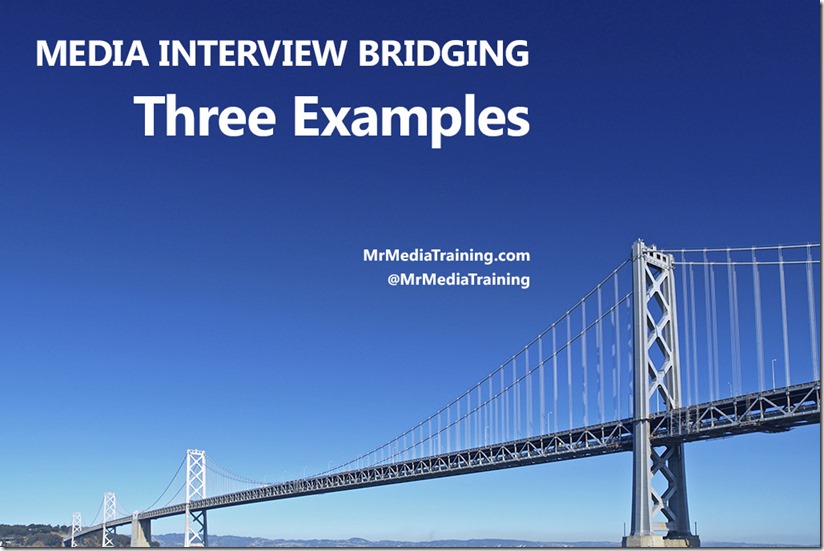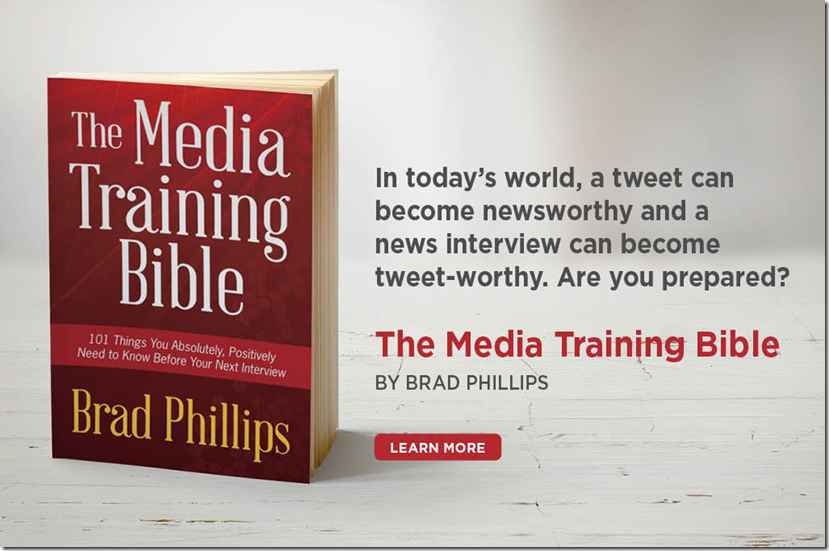Media Interview Bridging: Three Examples
So far in our media bridging series, you’ve learned what a bridge is and when to use one, seen a list of sample bridge lines, and read an example of a bridge in action.
In this post, you’ll find three additional examples of bridging during an interview. To make this post as helpful as possible, I selected three types of questions interviewees often face: speculative questions, false premise questions, and accusatory questions.
If you missed the introduction to this series, you might start there before reading further. And remember: the goal of a bridging statement isn’t to evade the question, but to answer the heart of the question before articulating your most important points.
Speculative Question
Reporters love questions that ask you to go beyond your existing knowledge by speculating about the unknown. Many such questions are innocuous; their questions asking you to peer into the future are simply trying to draw upon your expertise to forecast the most likely outcome. But in other cases, answering speculation questions can damage your reputation, particularly if you guess wrong and journalists use that incorrect guess against you in the future.
Here’s an example of a time you might not want to speculate.
[Question] “You’ve been generating a lot of press for your upcoming new product launch. Do you think the new version will immediately become the bestseller in its category, or are you anticipating a longer climb to the top?”
[Answer] “We know from our beta launch that consumers are responding very favorably to this new version. [Bridge] More specifically, [Message] our early testers have been really enthusiastic about the easy-to-use voice commands and one-click editing functionality, which none of our competitors have. So we’re optimistic that consumers are going to respond well.”
Most reporters would be satisfied with that reply, which addresses the heart of the question (how well will this product sell?). But if the reporter presses again, you can be even more direct.
[Question] “But to my question, do you think it’s going to be number one in its category from the moment it comes out?”
[Answer] “That’s a question consumers will decide, not us. [Bridge] But that said, [Message] we’ve rarely seen a product test this well at this stage. We truly believe that consumers will see the value in this and upgrade the first chance they get, because the new functions will shave hours—and in some cases, days—off their total project time.”
False Premise Question
Reporters occasionally embed a false premise into their questions. Sometimes, that’s due to a reporter being biased or intentionally provocative. But in my experience, false premise questions are not always asked as a trap. Rather, reporters sometimes assume the so-called “conventional wisdom” is true and ask questions as if it is.
[Question] “It’s obviously not possible to get bipartisan support for your proposal in this difficult political climate. Is there any chance you can pass this with just support from your own party?”
[Answer] “Actually, I’m not sure that’s true. [Bridge] I’ve had conversations with people from both parties, and what I’ve found is [Message] a hunger from both sides of the aisle for these types of commonsense reforms. Remember: even in a climate where there’s not agreement on a great number of issues, we still agree on at least a few of them. From the reception we’ve been getting, we have reason to be optimistic that this is one of them.”
Accusatory Question
A St. Louis, Missouri city official was once confronted by a reporter who showed up without notice and demanded to know why she was driving a $26,000 car paid for by taxpayers. Her public relations aide tried to stop the interview (which only made her boss look guilty), and the official’s tone made clear she resented the reporter’s intrusion.
Their response was unfortunate, particularly because the question being posed to her was answerable. Here’s how she could have answered the question.
[Question] “Are you going to give back that car [that cost taxpayers $26,000]?”
[Answer] “It’s important to explain why I have that car. [Transition] What many people don’t realize is that [Message] the city provides a car to a few senior officials as part of our annual compensation package because we use the car to visit our constituents all over the city. Using our personal vehicles might actually cost taxpayers more, because the reimbursement rate for personal vehicles can cost more than allowing an official to use a car owned by the city. Many other cities have a similar arrangement with officials for the same reasons. So I believe that’s fair—but if any of the people I serve disagree, they are welcome to contact my office and talk to us about it.”
Stay tuned for Part Four of this series.




